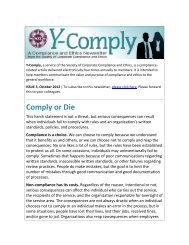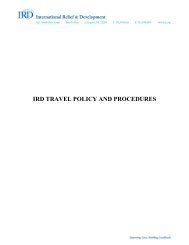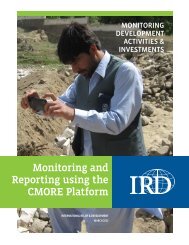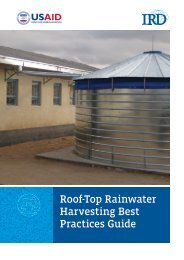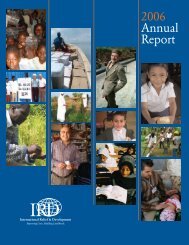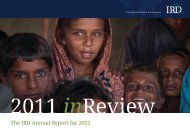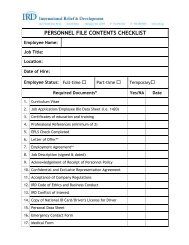Empowering citizens Engaging governments Rebuilding communities
Empowering citizens Engaging governments Rebuilding communities
Empowering citizens Engaging governments Rebuilding communities
You also want an ePaper? Increase the reach of your titles
YUMPU automatically turns print PDFs into web optimized ePapers that Google loves.
“<br />
The partnership with CSP made these<br />
things possible. Finally, people saw that<br />
it was worth kicking out al Qaeda”<br />
—Andrew Wilson<br />
never thought an NGO could operate like that, in that<br />
type of environment. We didn’t go through any training<br />
where we were taught, ‘Go find your local NGO. They’re<br />
going to help you win the war.’ They’d be stupid not to<br />
teach that now.”<br />
A year after the Ramadi stabilization effort began, in<br />
October 2007, Gartner and Charlton were among more<br />
than 400 attendees at a grand opening ceremony<br />
for the Ramadi Business Center. Local leaders,<br />
Iraqi government officials, business owners, military<br />
personnel, US congressmen, and media attended<br />
the ceremony, which Ramadi Mayor Ayadah called “a<br />
shining day in the history of the Al-Anbar governorate.”<br />
Within two years, the center had become a locus of<br />
economic development. In November 2009, more than<br />
4,000 entrepreneurs, investors, and corporate representatives<br />
from Jordan, Turkey, and the United Arab<br />
Emirates and other countries gathered at the business<br />
center for the Al-Anbar Trade Fair. According to USAID,<br />
which offers ongoing support for the business center,<br />
more than 300 Iraqis a month were receiving vocational<br />
skills training at the same location in courses<br />
that range from secretarial skills to corporate sales<br />
and accounting, from how to apply for a job to how to<br />
write a business report. Qassim Mohammad Abed,<br />
governor of Anbar province, praised the trade fair and<br />
the business center for demonstrating that Ramadi<br />
and the governorate of Al-Anbar were again “open for<br />
business.”<br />
“The 17th Street Market, that was a huge turning<br />
point,” Wilson said. “Before long, John McCain, Joe<br />
Lieberman, and people like that were coming to Anbar.<br />
That dramatic difference that life was getting better in<br />
Ramadi, it all had to do with CSP. Neighborhoods were<br />
being cleaned up, soccer leagues were starting, and<br />
businesses were opening. It wasn’t all done by the<br />
military. The partnership with CSP made these things<br />
possible. And when you add them up, it’s like the<br />
straw that broke the camel’s back. Finally, people saw<br />
that it was worth kicking out al Qaeda.”<br />
While many projects were driven by military or USAID<br />
considerations, the operational reality in Iraq was<br />
that close coordination of all CSP stakeholders was<br />
needed to complete projects. “In a stabilization<br />
program, relationships, particularly with the military<br />
but really with any involved decisionmaker, are key<br />
success factors,” Ismael said. “CSP was unique in<br />
that USAID was working right alongside the military,”<br />
Gartner said. “The key to CSP’s success was the<br />
military buying into it. If the military sees you as a<br />
resource, and you have resources to bring to the table<br />
to directly support counterinsurgency efforts, then it<br />
will work.”<br />
2<br />
A complete stabilization package<br />
33


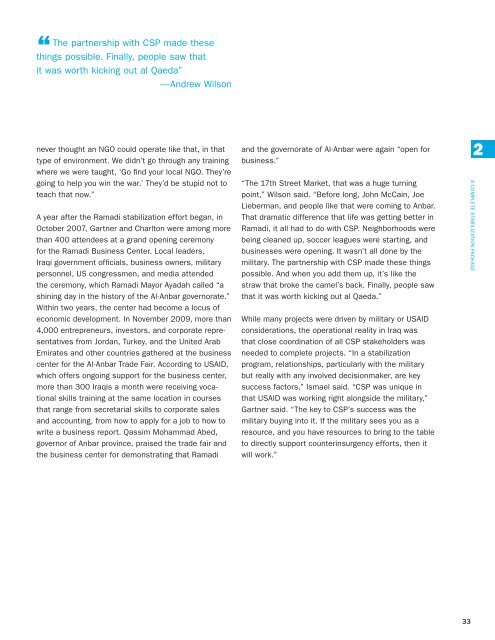
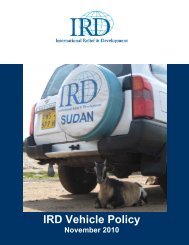
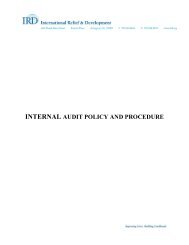
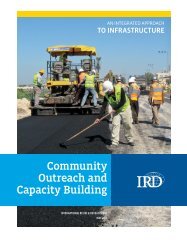
![Guide bonne pratique production d'oignon qualité_VF_4_2411012[1]](https://img.yumpu.com/23506639/1/184x260/guide-bonne-pratique-production-doignon-qualitac-vf-4-24110121.jpg?quality=85)

